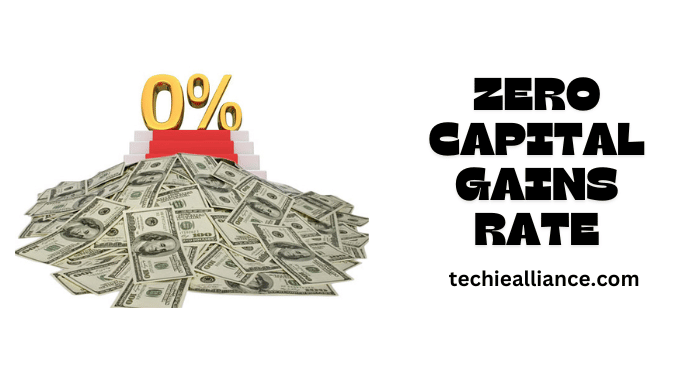The zero capital gains rate can be applied by a given level of government in order to prompt investment in a given area.
What Is The Definition Of A Zero Capital Gains Rate
A zero capital gains rate means a 0% tax rate on capital gains. Individuals selling property in a "enterprise zone" may be charged this 0% rate. A zone is a geographic region that has received special tax advantages, regulatory exemptions, or other forms of state support to promote private economic growth and job creation. Typically, they aim to revitalize an area.
KEY TAKEAWAYS
A zero capital gains rate means no taxes on the disposal of assets or property that would otherwise result in a capital gain.
A 0% interest rate on property sales is most commonly connected with enterprise zones, which are specific locations designated by the government to stimulate development and economic progress.
In order to maintain a 0% capital gains rate, property owners must fulfill specific qualifications and regulations, which may change amongst economic zones.
Read also: Case Studies of Effective Enterprise Resource Planning
Understanding the Zero Capital Gains Rate.

The Working Families Tax Relief Act was enacted by the United States Congress in 2004 and approved by the President.1
United States Congress. "H.R.1308 - Working Families Tax Relief Act of 2004." Accessed: February 6, 2020.
The act includes measures that extend the 0% capital gains tax to certain properties sold within designated economic zones.2 Enterprise zones were established in the United States in the 1970s to reverse the migration of people and companies from metropolitan areas to the suburbs. The initiatives can be used to encourage a private firm to stay, expand, or relocate to a certain neighborhood.
The reasoning behind this measure is to incentivize individuals to invest in this area. The rate is not limited to any certain region, state, or municipality. Legislators seeking to create employment and attract investment to a region typically adopt zero capital gains tax rates or other tax breaks in that area.
A 2012 tax reform made the 0% capital gains rate permanent for most filers, as long as they are single with a taxable income of under $37,950 or married with a taxable income of less than $75,900.3 Even yet, some filers face moderate tax rates of 25% to 30% if they earn extra income taxed at ordinary rates. This shifts their long-term gains or eligible dividend income from the 0% bracket to the 15% bracket for investment income.
On the other side, itemized deductions may reduce regular income, lowering individuals' tax brackets and raising capital gains or dividends taxed at 0%. This explains why taxpayers can have substantial adjusted gross incomes while paying no taxes on long-term capital gains.
Read also: Small and Midsize Enterprise (SME) Definition: Types Around
Consider the D.C. Enterprise Zone.
Each enterprise zone has its own set of norms, which may vary based on law changes. For example, the D.C. enterprise zone must meet the following mandates:
- During ownership, the property should have undergone significant improvements.
- The property must be held for at least five years from the date of acquisition.
- At least 80% of the total gross income from property ownership must originate from active company operations within the D.C. Enterprise Zone.
- If the property is being rented out commercially, at least half of the rental income must originate from firms situated in the D.C. enterprise zone.
- If significant changes have been made to the property, the taxpayer is considered to have started using it.

